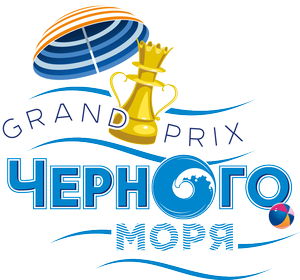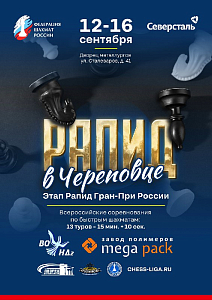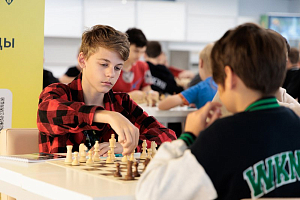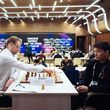16 September 2016
Ultimate Round Arithmetics
The decisive round of the Olympiad in the review of grandmaster Dmitry Kryakvin.
The last day of the men's competition promised to both the Americans and the Ukrainians something of a real biathlon race - who is going to spend less bullets at the last shooting range? With one round to go the additional tie-breakers favored the Stars and Stripes team, and there was a consensus of observers' opinions that even if Caruana, Nakamura and colleagues were to win with a minimum score, the Ukraine had to come back by winning almost every game of their match!
Up to a certain moment it seemed like a fairy tale scenario, but it turned out that Canada was not willing to just to concede two points on a silver platter to their neighbors. However, Caruana - Bareev showed that it has passed quite a while since the times when Evgeny Ilgizovich ranked third in the FIDE rating list and was considered the largest specialist of the Caro-Kann defense, but the rest of the Canadian squad made their famous opponents look up to them with respect.
Hansen (2582) – Shankland (2679)

Hansen repeated moves several times, but then looked at other boards to assess the situations and continued fighting bravely.
20.Ng3 Qf6 21.Nh5 Qf5 22.g4!
This pawn advance wins a pawn for White, but Black is not without counterchances of his own.
22…Qc8 23.Nxe5 Nxe5 24.dxe5 Qc7 25.Qe2 Rad8 26.Nf4
The knight returns into the game and is ready to protect the material gain from d3. White needs to consolidate his position because he is unable to contest the d-file for as long as it takes to protect the e5-pawn.
Shankland, in his turn, needed to find a rather complicated geometry: 26...Qe7! 27.Kg2 (also unclear is 27.Rad1 Rxd1 28.Qxd1 Qg5) 27...Qc5, maintaining tension and preventing White from unbinding his pieces. Samuel acted in a more modest fashion so that after the white rook's transfer to e2 it became apparent, according to master Mnatsakanyan, that Hansen was simply up a pawn!
26…Rd7 27.Kg2 Kh8 28.Rac1 a6 29.Rc2 Qd8 30.Qf3 Bc7 31.Rce2, and Eric went on to win the game by breaking through Black's defenses with е5-е6.
Hikaru Nakamura singed peace with Anton Kovalyov, and the Americans would have never seen 'gold' if not for a terrific blunder of the Canadian board three.
So (2782) – Lesiege (2512)

Prior to the time trouble period Alexandre Lesiege performed very resourcefully and a 300-Elo-point disparity was not felt at all Now the Stockfish advises Wesley a cunning continuation 34.h4! Qg4 35.Nd5 Re8 36.Nf4! with a certain amount of initiative. So opted for a more human approach, which was to result in a draw, but Alex responded with a move that decided the fate of the Olympiad...
34.d5 Qe5??
Good Lord! In the case of a simple 34...Rd3 35.c6 (35.Qa1+ Qf6) 35...Qxc1 36.Rxc1 Rdd2 the black rooks are ready to engineer a perpetual check, but Lesiege simply abandoned his heavy piece en prise, probably counting on 35.d6? Re1. So does not need to be asked twice and accepts a generous gift.
35.fxe3 Qg3 36.Qa1+, and Black had to resign because he is getting checkmated first: 36…Kg8 37.Qa8+ Kg7 38.Ne8+ Kh8 39.Nd6+ Kh7 40.Rxf7#. Only to think that the Canadian happiness was so near - in the case of a match draw they would have taken the high fourth place on tiebreakers!
The Ukraine, on the other hand, was winning with confidence as Anton Korobov and Andrei Volokitin reached their goals in a relatively trouble-free manner. It was, therefore, somewhat surprising to see Ruslan Ponomariov's willingness to agree to total exchanges and a subsequent quick draw with Luka Lenic. However, the news quickly spread around the chess world: one of the Ukraine's Baku opponents did extremely well in the final round so that Pavel Eljanov's victory over the veteran Alexander Genrikhovich Beliavsky would lower the USA team to the second place! Beliavsky was long teetering on the edge, but in the end did not stand the pressure of his counterpart.
Eljanov (2739) – Beliavsky (2602)

74.Rh1 b5?
This is an ill-timed activity and instead Black should have preferred 74...Nc6 75.Rh7+ Ne7 76.Rg7 Kd8, defending the weak pawn on g6. White is better, but with such a reduced amount of material on the board a draw is the most likely outcome. An attempt to counterattack the f4-pawn fails to reach its goal.
75.axb6 Ra2+ 76.Kg3 Ne2+ 77.Kh4 Nxf4
The resistance could be prolonged by 77...Ra4 78.Ne5+ Kc8 79.Nxg6 Kb7 80.Rh2 Nxf4 81.Nxf4 Rxf4+ 82.Kh5, although this rook ending is easily winning for White.
78.b7!, and a dying a5-infantryman ended up making a glorious career.
Subsequent events were colorfully described by the Azerbaijan-2 captain, grandmaster Emil Sutovsky.
"There is nothing similar in terms of drama that I have seen throughout my entire career. Nothing even remotely close to this.
The Americans are far from convincing in their match against the Canadians so that at a certain moment they were at risk of not winning at all, but in the end they still prevail 2.5-1.5. The Ukrainians need to score a whitewash victory. Korobov wins confidently, so does Volokitin in the sharpest of struggles. After the time control move there remains only Eljanov, opposed by the native of Lviv Alexander Genrikhovich Beliavsky, who has been playing for Slovenia for many years now. Eljanov is slightly better, but Beliavsky keeps his position together in a confident fashion. The Ukrainians need a victory as much as they need breathing air. Just imagine that out of a host of other Olympiad players the road to the Olympic gold should be barred by no other person but Beliavsky, the native of Lviv!
Eljanov is seeking to find a loophole, but Beliavsky is as hard as a rock for as long as he does not get an opportunity to lash out with an active move following the period of his lengthy defense. When he does so, his position falls apart. The Ukrainians run up to Eljanov and start hugging and rejoicing. Ukraine is the Champion! But no, it is not!!! Later it turns out that the broadcasted result of one of the games from the Germany - Estonia match, affecting the tiebreakers of the teams, was displayed incorrectly. Thus, at the end the Americans overtake the Ukrainians on tiebreak by mere inches... What a DRAMA!"
The score is 413,5-404,5 in favor of USA! Indeed, any other match result of the Americans and Ukrainians' opponents could have changed the balance of forces on the podium. At the end the fate of gold medals was largely sealed in the Germany - Estonia match, which ended 2.5-1.5 in favor of the Germans, who have not achieved much of a success in Baku.
The third place went to the Russians, who have landed two match points ahead of a group of teams sharing 4th-10th places. The Italians did not stand the pressure of Andrey Filatov's team, even though this match victory is anything but a lopsided one.
Rombaldoni (2567) – Tomashevsky (2731)

26.Qc7+ Ka8?!
Chess is an amazing game with a spectacular computer type of geometry. The electronic mind claims that the black king should literally go crazy and move forward ahead of his pawns!
An incredible 26...Ka6!! 27.Rc4 (or 27.Qxf7 Bd4 28.Bxd4 Qxd4 29.Rc7 Ra8!) 27...Qb5! 28.Kg1 Rb8!! 29.Rb4 Qe8! 30.Kh2 Bf8! (each move is worthy of an exclamation mark) would have left Black with winning chances, whereas the text move allowed Rombaldoni transposing into a drawn pawn ending.
27.Qxf7 Qd3+ 28.Kf2 Bd4 29.Qxe6 Qd2+ 30.Kf3 Qxe3+ 31.Qxe3 Bxe3 32.Kxe3 Kb7 33.g4, and the power of the passer compensated for the missing pawn.
Yet another textbook case of a positional and endgame masterpiece has been created by Vladimir Kramnik. The current rating of the former world champion has reached the level of 2817! Who else in the history of chess was performing this strong at the age of slightly over forty? Viktor Korchnoi? That was another era with a different level of competition. In his forties even Garry Kimovich, with all his greatness, was not demonstrating a similar strength, such a desire to play and win.
Kramnik (2808) – Vocaturo (2583)

17.Be7!!
Like a bolt from the blue! As you cannot go for 17...Rxe7 18.Nxc6 Rxd2 19.Nxe7+ Kf8 20.Nxc8, the game transposes into the "rook and pawn versus two minor pieces" type of ending - a bread-and-butter tool of Kramnik's!
17…Rxd4 18.Rxd4 Rxe7 19.Rd8+ Ne8 20.Nxe4 Be6 21.Ra8
Not only Black is pressed along his home rank, but his a7-infantryman is about to perish.
21…Be5 22.Rdd8 Kf8 23.Rxa7 Bc7
Vocaturo lays a snare for White, but steps into it himself. Better was 23...Bf5 to drive the knight away from f6 so that after 24.Ng5 Bc7 25.Rda8 Bb6 26.Rxa6 bxa6 27.Rxa6 Black could have put up further resistance.
24.Rda8 Bb6 25.Rxa6 bxa6
Black's expectations of 26.Rxa6 Rb7 27.c5 Bd8 28.Rxc6 Ra7! fail to materialize since White has a much stronger rejoinder.

26.Nf6! Bd7 27.b4
His pieces stalemated in a position full of material, it forces the Italian player to allow the white knight on d5.
27…c5 28.Nd5 Bc6
The b6-bishop is clearly unhappy about 28...Re6 29.Rb8.
29.Rxa6 Bxd5 30.Bxd5 Bd8
Now White has three pawns for a piece and his remote passers are especially strong with the support of an unopposed light-squared bishop of the Russian. The battle outcome is near.
31.b5 Rd7 32.b6 Ke7 33.b7 Bc7 34.Ra8 Nf6
Holding the last line of defense is impossible 34 ... Rd8 35.a4 Nd6 36.a5 Nxb7 37.Ra7 with a winning opposite-colored bishops and rooks ending.
35.Rc8 Bd6 36.Bc6 Rd8 37.a4 Nd7 38.a5 Bb8 39.a6 Ne5
Vladimir Kramnik could not help himself from wrapping up the game nicely.

40.Rxb8! Rxb8 41.Bd5 Black resigns.
The pawns are the soul of chess! By the way, they have recently celebrated François-André Danican Philidor's 290-year birth anniversary.
Among the group of teams that scored 16 points the most happy were the Norwegians who took place among the best for the first time in history. Carlsen's second Jon Hammer posted: "Unbelievable. 5th place in Chess Olympiad! So happy I have team mates who perform when I don't!" On the final day Magnus drew with the Challenger's offender Harikrishna, but the Indians could not profit from their rating superiority on the remaining boards. To be more precise, they could but not in every game.
Urkedal (2537) – Sethuraman (2640)

Blackout of the early morning.
16...Bxe3+?? 17.Qxe3 Bg4 18.Be5, and White is up a piece. Desperate efforts of the founding fathers of chess resulted only in 2-2.
The Brits failed to take a well-deserved fourth place. The match with Peru ended with a 2-2 score only, while in one of the games there arose a very picturesque position.
Howell (2665) – Cori (2609)

Black has some compensation for the missing pawn, and the best plan would be 28.Bc4 to securely defend the g2-square from f1. Howell, however, neglected preventive measures and got a stab with a stiletto in return.
28.Qf4? f5!!
You can neither take en passant, nor there is 29.Bxe6 Qc6 or 29.h5 Qc6; White lost control of the e4-square -- the events have taken a rather bad turn.
29.Nf1 Ng6 30.Qh2 Qc6
It is curtains also after 31.b4 Nxh4, but other than that there arose a structure on the board that can be termed "a Howell's queen."
31.g3 Rh8

32.f4
The h4-strike is inevitable: 32.b4 Nxh4 33.gxh4 Rxh4.
32...Nxh4 33.gxh4 Rxh4 34.Qg3 Rh3, and Cori celebrated success.
In the women's section landslide victories were scored by Poland and the Ukraine, but eventually the tiebreakers of the Rzeczpospolita envoys turned out slightly higher. The fate of the gold was sealed in the principled match China - Russia, in which Rublevsky's disciples needed nothing else but victory since even a draw would leave them outside the medal trio. The Russians went into the battle in high spirits: the previous round saw them coming up with exceptional birthday congratulations to Alexander Riazantsev, a chief theoretician of the coaching staff, by winning over Georgia, and they were eager to build up on this success. Natalija Pogonina converted her advantage in a very subtle manner.
Pogonina (2484) – Guo Qi (2417)

Natalija was not allured by the 30.Qxd7 Nxd7 31.bxa5 bxa5 32.Nxf7 Nb6 33.Nd6 Nd5 continuation with an extra pawn at the end since in this case the black pieces would occupy good outposts. Instead of winning a pawn Pogonina strives at domination.
30.b5! h6 31.Be3 f6 32.Nf5! Qa7
The whole line justification is based on the fork idea after 32...Qxc6 33.Nxe7+.
33.Nxe7+ Qxe7 34.exf6 Qxf6 35.Bxb6
The b6-pawn has been eliminated and there is nothing that Black can do to counter the b5-b6-b7-b8 idea.
35…Ng6 36.Qc7 Rf8 37.Bd4 e5 38.Bc5, winning shortly after.
Alexandra Kosteniuk contested the mighty world champion on equal terms - the board one fight evoked memories of Nalchik 2008, when the Muscovite stopped a young Hou. This time, a fierce battle with a high level performance, demonstrated by both participants, ended peacefully, but failure was in store for Aleksandra Goryachkina, who handled the Meran type of position in a shaky fashion and could not hold out in the end.
It goes without saying that Russia's main hope in this match rested with Valentina Gunina - a holder of the best performance in the women's section. Besides, she was pitted against Ju Wenjun, who's Baku performance was not especially impressive. A well-known chess master and journalist Nikolai Vlasov dedicated the following beautiful lines to Gunina: "Valentina Gunina deserves many and enthusiastic lines written about her. There must exist some special name, because "a goddess of victories in hopeless positions" sounds too lengthy, and I recall no such goddess in any of the existing mythologies. Here she is, and we are her contemporaries. Caissa is just a nymph, a true goddess of chess is she - the one in the flesh. One of the most prominent heroes of the Olympiad, Baadur Jobava, is just a "male version of Gunina" set against her background."
Unfortunately, out reliance on board two did not pay off. Here the nymph was met by a real Nemesis - Ju gathered for a decisive battle, thwarted the premature offensive attempts by her rival and transposed into a better ending.
Gunina (2520) – Ju Wenjun (2583)

29.Rd5?
A fatal loss of a tempo. After 29.Rxd8 Rxd8 30.Kg2 Rb8 31.Nd5! Bb2 32.Rc2 Bxa3 33.Nc7 White wins back the c4-pawn and has a decent position at that. Having wasted precious time, Gunina is no longer capable of preventing the black rook from infiltrating her camp.
29...Rxd5 30.Bxd5 Rd8! 31.Bc6
31.Be4 Bc5 is no better than that.
31...Rb8 32.a4 Bxc3! 33.Rxc3 Rb3 34.Rc2, and the black king directed his steps towards the passed pawn 34…Kf6 35.Kg2 Ke6, killing all hopes of the Russian chess fans.
The last round defeat hurled the Russians back into sharing equal amount of points with the United States, India, Israel, Vietnam and the host team, which is considered a tournament revelation, but the additional tiebreakers awarded the winners of the Khanty-Mansiysk, Istanbul and Tromsø events with the fourth place. We wish a speedy recovery to Ekaterina Lagno and will be looking forward to the 2017 European Championship in Halkidiki.
A wonderful holiday of chess in Baku has come to an end. We wish to express thanks to the organizers and say good-bye to our dear friends! See you next time!





















